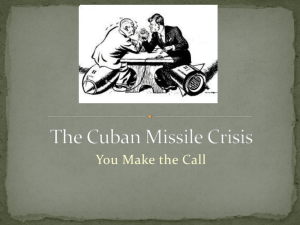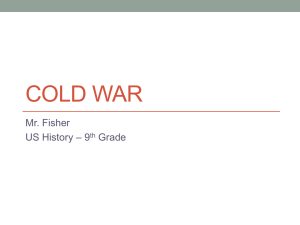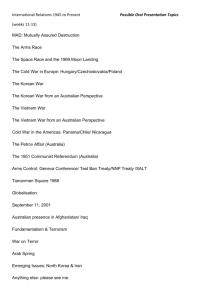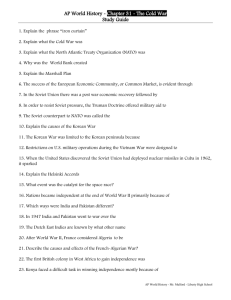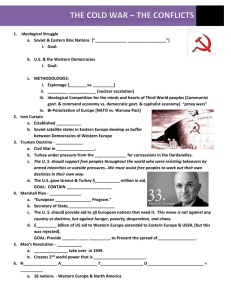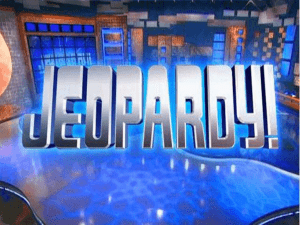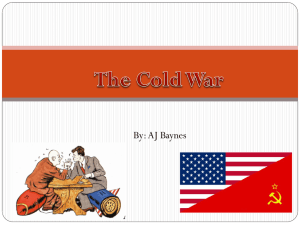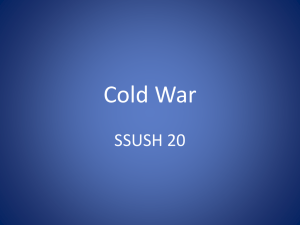Cold War Unit Test Revised - adstokes
advertisement
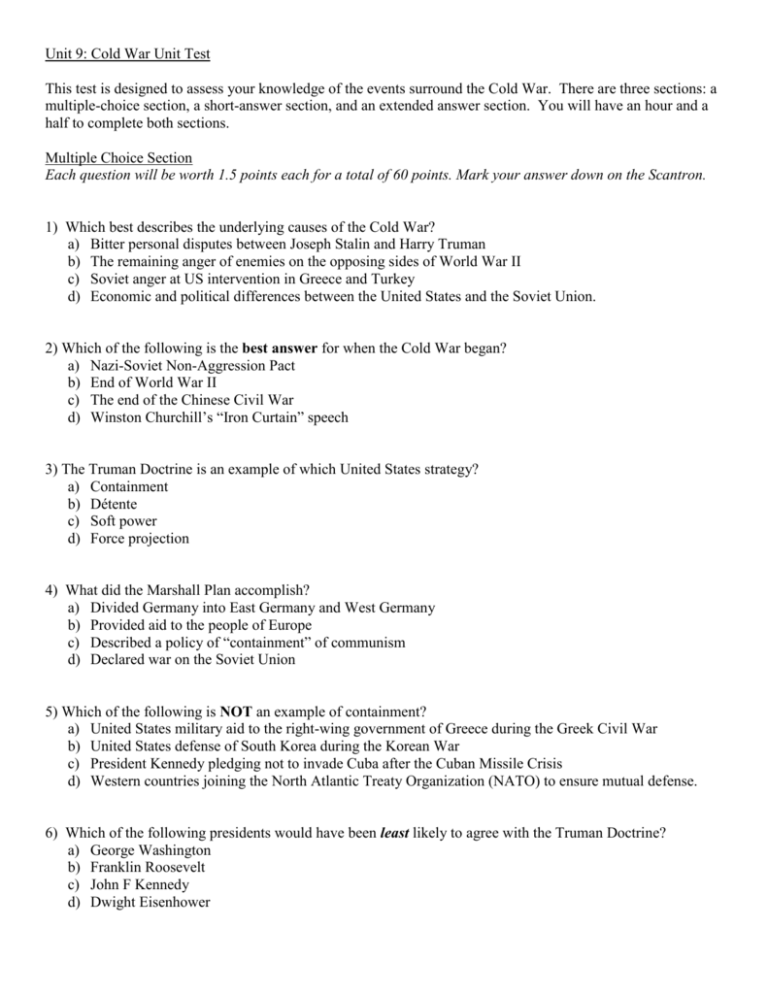
Unit 9: Cold War Unit Test This test is designed to assess your knowledge of the events surround the Cold War. There are three sections: a multiple-choice section, a short-answer section, and an extended answer section. You will have an hour and a half to complete both sections. Multiple Choice Section Each question will be worth 1.5 points each for a total of 60 points. Mark your answer down on the Scantron. 1) Which best describes the underlying causes of the Cold War? a) Bitter personal disputes between Joseph Stalin and Harry Truman b) The remaining anger of enemies on the opposing sides of World War II c) Soviet anger at US intervention in Greece and Turkey d) Economic and political differences between the United States and the Soviet Union. 2) Which of the following is the best answer for when the Cold War began? a) Nazi-Soviet Non-Aggression Pact b) End of World War II c) The end of the Chinese Civil War d) Winston Churchill’s “Iron Curtain” speech 3) The Truman Doctrine is an example of which United States strategy? a) Containment b) Détente c) Soft power d) Force projection 4) What did the Marshall Plan accomplish? a) Divided Germany into East Germany and West Germany b) Provided aid to the people of Europe c) Described a policy of “containment” of communism d) Declared war on the Soviet Union 5) Which of the following is NOT an example of containment? a) United States military aid to the right-wing government of Greece during the Greek Civil War b) United States defense of South Korea during the Korean War c) President Kennedy pledging not to invade Cuba after the Cuban Missile Crisis d) Western countries joining the North Atlantic Treaty Organization (NATO) to ensure mutual defense. 6) Which of the following presidents would have been least likely to agree with the Truman Doctrine? a) George Washington b) Franklin Roosevelt c) John F Kennedy d) Dwight Eisenhower 7) Which is the following is the best description of the North Atlantic Treaty Organization? a) A defensive alliance against a possible Soviet invasion of Western Europe b) An alliance of countries previously part of the British Empire c) A military alliance with the goal of liberating communist Eastern Europe d) A trade partnership between Britain, Ireland, and Iceland. 8) What was the main goal of the US’ Cold War foreign policies a) The US wanted to make sure it stayed a superpower b) The US wanted to prevent the spread of communism c) The US wanted to reunite countries like Korea and Vietnam d) The US wanted to send money to all of its allies Use the cartoon below to answer questions 9 and 10 9) What would be the best title for this political cartoon? a) “A Peep Under The Iron Curtain” b) “Churchill Closes The Blinds” c) “A Fragile Peace” d) “Are You There, Poland? It’s me, Winston” 10) If Winston Churchill is kneeling in West Germany, he is most likely looking into which country? a) Poland b) France c) Great Britain d) East Germany 11) What happened to Germany after WWII? a) Germany was divided into occupied zones, which later became East and West Germany b) Germany had to give up its colonies and give some land, like AlsaceLorraine, to France c) Germany had to take full responsibility for the war and pay reparations (money) d) Germany was unable to recover and fell into an economic depression 12) In response to the formation of NATO, the Soviet Union a) Left the United Nations b) Ended the Berlin Blockade c) Created the Warsaw Pact d) Joined the Marshall Plan 13) Mutually-Assured Destruction (MAD) is most closely related to which of the following US strategies? a) Containment b) Massive retaliation c) Détente d) Isolationism 14) Which of the following is the best answer for the start of the Korean War/? a) South Korean invasion of North Korea b) North Korean invasion of South Korea c) The Japanese invasion of Manchuria d) The death of Sun Yat-sen Use the following two maps to answer question 15 15) What generalization about the Korea War is supported by information on the maps? a) b) c) d) The war began when South Korea attacked North Korea General MacArthur launched an invasion of China early in the war Neither side experienced a major military victory in the war At the end of the war, Korea remained a divided country Use the map below to answer question 16. 16) The map above could best be used to show which of the following? a) The collapse of international peace-keeping efforts in Europe. b) The creation of a common European market. c) The division between communist and non-communist alliances in Europe.. d) The increase in the number of neutral nations in Europe. 17) Which of the following did President Kennedy tell the American people in his inaugural address? a) “The only thing we have to fear is fear itself.” b) His 14 Points for world peace c) That the Soviet Union must tear down the Berlin Wall d) “Ask not what your country can do for you; ask what you can do for your country.” 18) Which of the following was an outcome of the Cuban Revolution led by Fidel Castro? a) The Cuban economy prospered under a new communist regime b) Thousands of Cubans fled to the United States c) Cuba entered the United States sphere of influence d) Tension increased between the Soviet Union and the new Cuban government. 19) What was the purpose of the Berlin Wall? a) To divide all of Europe between countries that supported the Soviet Union and those that supported the US b) To keep communists from spreading into and taking over democratic West Germany c) To keep people living in communist East Berlin from leaving and going to democratic West Berlin. d) To surround all of communist East Germany so that no one from the West could get in. 20) The failed CIA-led invasion of Cuba was the: a) Bay of Pigs b) Berlin Airlift c) Cuban Missile Crisis d) Alger Hiss Incident Use the map to answer question 21. 21) The presence of Soviet nuclear missiles at each of the three markers started off the: a) Bay of Pigs Invasion b) Berlin Airlift c) Cuban Missile Crisis d) Alger Hiss conviction 22) Which of the following is not an outcome of the Cuban Missile Crisis a) The United States pledged not to invade Cuba b) The United States and Soviet Union established a hotline to improve communication c) The United States regained Cuba into their sphere of influence d) John Kennedy became more popular among the American people 23) Which of the following words best describes the build up of US troops in Vietnam? a) popular b) gradual c) illegal d) successful 24) The United States’ experience during the Vietnam War supports the idea that the outcome of a war a) is determined mainly by technological superiority b) is dependent on having the greater number of troops c) is assured to countries dedicated to democratic ideals d) can be strongly affected by public opinion 25) Following the United States’ military withdrawal from Vietnam in 1973, Vietnam a) became a democratic nation b) remained divided between North and South c) adopted a communist form of government d) was quickly taken over by China 26) The image below shows which consequences of the Cold War? a) b) c) d) The space race led to a high emphasis on math and science in US public schools Students were drilled on how to respond to a nuclear attack Increased funding for public education Stricter discipline in schools to protect against communist influence 27) During the Cold War, American troops were stationed in all but which of these countries? a) Vietnam b) West Germany c) Japan d) US troops were stationed in all of the above countries 28) What is the best example of how Hampton Roads benefited from the Cold War? a) Norfolk shipyard received more business form the US military b) Christopher Newport University grew in prestige c) Magnet schools such as Woodside High School were built to help win the Space Race d) Tourism in Virginia Beach increased 29) The growth of McCarthyism in the early 1950s was based on a) a public fear concerning the spread of communism in the United States b) outrage over government corruption c) dissatisfaction over the results of World War II d) hardline military officers who supported attacking the Soviet Union Use the photograph below to answer the question 30. 31) Which of the following best completes the headline? a) “Rosenbergs Executed” b) “American Agents Captured In Moscow” c) “Industrial Spying Gone Wrong” d) “Married Couple Accused Of Stealing Military Secrets Await Trial” 32) Which of the following is the best description of Mikhail Gorbachev’s policies of perestroika and glasnost? a) Economic and political liberalization b) Political oppression c) Purging of opposing politicians d) Putting a halt to the arms race 33) Which of these was not a reason for the collapse of the Soviet Union? a) Rising nationalism in Soviet satellite states b) Military and economic pressure from the United States c) Market inefficiencies d) Coup d’état by Soviet military leaders 34) Which of the following was not an explicit post-Cold War goal of American foreign policy? a) Humanitarian rights b) Foreign aid c) Nuclear disarmament d) Human rights 35) Why was Operation Desert Storm so significant? a) It was the first American intervention in the Middle East b) It was the first conflict where women could serve openly in combat roles c) It was the first war in which the US was defeated d) It ended the Cold War 36) Which of the following was not an explicit goal of the Reagan Revolution? a) Justices who practiced judicial restraint b) Cutting tax rates c) Transferring more power away from states to the federal government d) Reducing size of government programs 37) How did Ronald Reagan aid in the collapse of the Soviet Union? a) He launched a series of armed conflicts against Soviet satellite states b) He pressured the Soviet Union with economic sanctions c) He threatened the Soviets with a nuclear attack if they did not give into his demands d) He publicly challenged the moral legitimacy of the Soviet Union 38) Which factor is most closely associated with McCarthyism? a) buildup of Soviet missiles in Cuba b) creation of the Warsaw Pact by the Soviet Union c) fear of communist influence in the United States d) rise of the Communist Party in China 39) President Nixon’s Vietnamization policy emphasized that the United States must a) defeat communism in Vietnam to preserve other countries. b) empower South Vietnamese forces to assume more combat duties. c) open trade relations with a unified Vietnam. d) use any means necessary to end the war. Use the cartoon below to answer question 40 40) This cartoon was published shortly after the: a) Berlin airlift b) Cuban Missile Crisis c) Korean War d) Vietnam War Short Answer Section Respond to each of the following four questions in three to five sentences. Write your response on the lined paper on the back of the test. Be sure to number each response. Each question will be worth 6 points. 41) How were troops greeted when they returned home from Vietnam? Is this similar or different to the treatment veterans received after other armed conflicts? 42) In your own words, describe Mikhail Gorbachev’s policies of perestroika and glasnost. 43) How was the Soviet involvement in Afghanistan similar to the American involvement in Vietnam? 44) Why was the United Nations more effective than the League of Nations? Essay Section (16 points) In five paragraphs, answer the following prompt. Be sure to include at least three pieces of evidence to support your response. Prompt: Who is more responsible for the end of the Cold War: Mikhail Gorbachev or Ronald Reagan?
